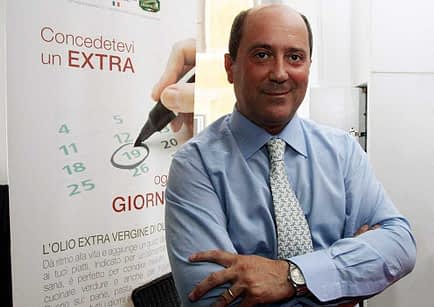
Massimo Gargano, chairman of the Italian olive growers’ consortium Unaprol
The latest decision of changing and reducing the IMU (the municipal tax for the real property) which was approved with much trouble and effort by the Italian Government in the last few days, will probably have positive consequences on the next olive harvest, since the tax on real estate has been completely cancelled for agricultural properties.
Massimo Gargano, chairman of the growers’ union Unaprol, said, “The cancellation of agricultural IMU will allow the Italian olive growing farms to reinvest those assets in the next olive harvest. But we also have to ward off the VAT rise, since it would have negative effects both on our export and internal consumption.”
Gargano’s comments come just as the upcoming olive harvest is forecast to be a strong one. “We should become quicker and more lively to act on the marketplace, combining the new opportunity given by the reduction of investment and production costs and the high quality of Made in Italy as it can be guaranteed by the Unaprol European Traceabilty Program.” Using the QR code, the program tracks over 600 growing groups including about 7,000 olive farms all over Italy whose production line is completely traced.
Gargano made his remarks during the latest Festival delle Storie held August 23 – 30 in the small villages of Alvito and Picinisco, not far from Rome. This was a spellbinding cultural exhibition dedicated to music, literature and performing arts that also hosted the cooking show by two famous Italian chefs, Niko Romito and Gennaro Esposito who used extra virgin olive oil certified by the Unaprol traceability system to unveil all the tricks and secrets of cooking with extra virgin olive oil.
And today, September 2nd, another meeting organized by Unaprol took place in Puegnago del Garda near the beautiful Garda lake — one of Italy’s most suitable terroirs for olive growing — to discuss Europe’s new Common Agricultural Policy and its effects on Italian olive oil production. The 37th edition of the local Valtenesi Fair also was the occasion for an in-depth analysis about Italian extra virgin olive oil, since olive growing and oil production are essential assets for the local landscape and economy.
Both events made good forums for presenting Unaprol’s surveys about last year’s olive oil consumption in Italy, where more than 217 millions liters were sold in 2012, for a value of 850 millions euros. Extra virgin olive oil accounted for 72 percent of the sales, while the olive oil grade accounted for 13 percent. The “100% Italian”-labelled extra virgin olive oil accounted for 12 percent of sales. Organic and PDO extra virgin olive oils performed modestly, slipping from 2011 levels both in value and volume.



